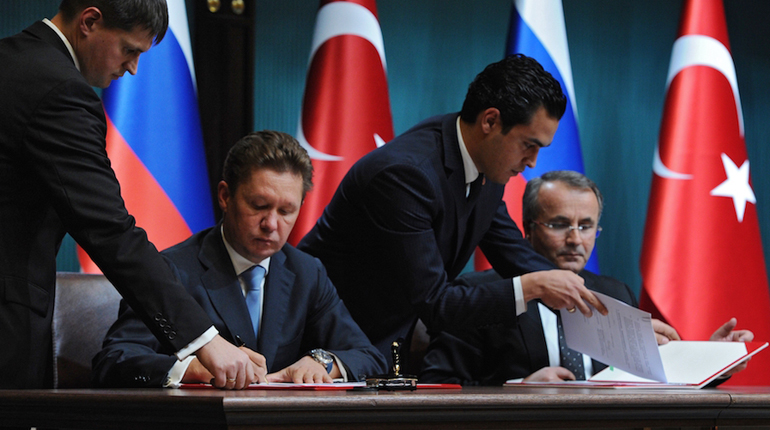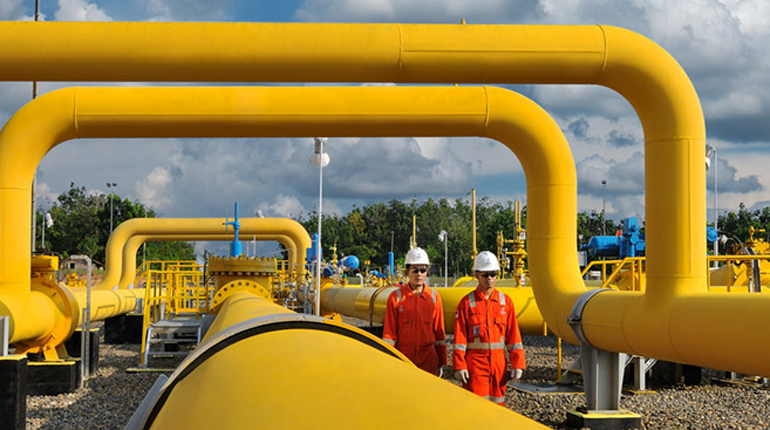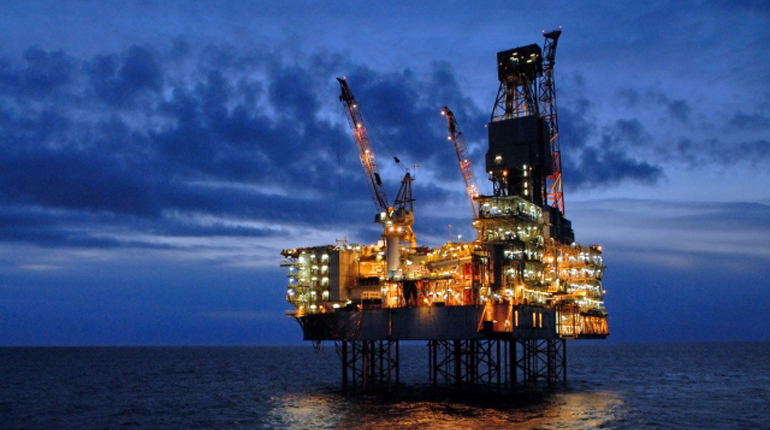 The initial Turkish Stream agreements being signed in December 2014. (Gazprom)
The initial Turkish Stream agreements being signed in December 2014. (Gazprom)
Turkey and Russia seem poised to complete a rapid turnaround in bilateral relations that could pave the way for an agreement on the development of the Turkish Stream gas pipeline project this summer.
Turkey’s economy minister, Nihat Zeybekci, met Russian Energy Minister Alexander Novak in Moscow on Tuesday. Afterwards Zeybekci told journalists the "political decision" had been taken to proceed not only with Turkish Stream but also with the Akkuyu nuclear power project.
"I do not think there is a question about the impossibility of implementing these projects. The issue will be discussed at the ministerial level first. But the final impetus for Turkish Stream will be provided by the meeting of the Russian and Turkish presidents," Zeybekci said, referring to a summit between Vladimir Putin and Reccep Tayip Erdogan to be held in St Petersburg on 9 August.
Zeybekci insisted a dispute over the price of gas deliveries to Botas from Gazprom was not covered during his session with Novak, which instead focused on the stalled gas pipeline project and Russian investment in Turkish nuclear power.
Gazprom’s deputy chief executive, Alexander Medvedev, said after the meeting that key issues over price and an intergovernmental agreement would be tackled during the August summit, although Erdogan is still dealing with the after-effects of the failed coup earlier this month.
"A working group of the Russian and Turkish energy ministries will be formed, in order to return this project to implementation. What is the working group’s goal? A meeting of the two sides is planned. There all the dates will be determined," Medvedev said.
Returning to normal
The broader talks, which have also included deputy prime ministerial level summits over recent days, signal bilateral relations are returning to normal after the downing of a Russian Su-24 jet near the Turkish/Syrian border last November by Turkish forces.
Putin and Erdogan have been at odds since then and infrastructure projects such as Turkish Stream had appeared to be on ice until Erdogan apparently apologised for the downing incident in a letter shortly before the coup.
"Whether this was due to the impact of Russian sanctions on the Turkish economy, or a desire on the part of Erdogan to signal to Ankara’s Western partners that Turkey had alternative geopolitical options is difficult to say with certainty, but the speed of the volte face was still remarkable," Daragh McDowell, principal analyst covering Russia for consultancy Verisk Maplecroft, told Interfax Natural Gas Daily.
While Erdogan has set about restructuring the Turkish state since the coup attempt, domestic turmoil is also providing a way to help patch up ties with Russia.
"Shortly after the coup attempt was foiled, Ankara announced that the Turkish pilots who shot down a Russian Su-24 near the Turkish-Syrian border last year had been involved in the conspiracy," McDowell said.
"While it is impossible to verify the veracity of this claim, the timing of the move is conspicuous; it does appear that Turkey is using the coup to remove any remaining obstacles to a full normalisation of relations."
Gazprom’s interest in reheating the full Turkish Stream project could be tempered by its apparent commitment to an expansion of Nord Stream and the potential for switching dependence on Ukrainian transit for dependence on Turkey, as well as uncertainty over the future direction of Russo-Turkish relations.
"Alienating Turkey from the West and bringing it into the Russian ‘camp’ would be a major geopolitical victory for the Kremlin, and Putin will do all he can to encourage it," McDowell said.
Katja Yafimava, from the Oxford Institute for Energy Studies, said the most likely option for Gazprom’s southern corridor initiative is now an undersea line forking in two under the Black Sea – one heading for Turkey and the other straight for EU markets.
"Post-rapprochement and coup, one string of Turkish Stream landing in Turkey and one string of South Stream landing in Bulgaria appears more likely," Yafimava said, citing the dual benefit of a route circumnavigating Ukraine while not depending absolutely on Turkish transit.
Turkish Stream was launched in December 2014 as a ready-made replacement for the cancelled South Stream project. Gazprom had estimated that up to 63 billion cubic metres per year would flow through the subsea lines, with a regeneration of the Interconnector Turkey-Greece-Italy pipeline project taking gas from the Turkish/Greek border into EU markets.








Talk to us
Natural Gas Daily welcomes your comments. Email us at [email protected].